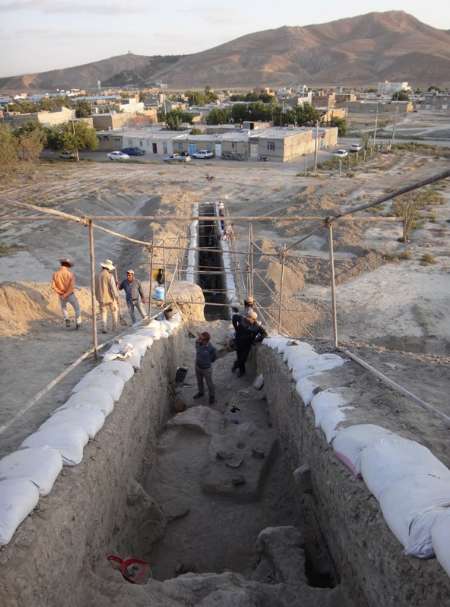The Public Relations Office of the Research Institute of Cultural Heritage and Tourism (RICHT) Organization quoted Ali Akbar Vahdati, head of the exploration team, as saying that following the signing of memorandum of understanding for research and education cooperation between RICHT and Nanjing University of China, a group of domestic and international archeologists have launched the second season of explorations on Tappeh Naderi.
Thanks to the fact that Tappeh Naderi is located in the residential texture of the city of Shirvan, organizing and sound determination of the limits of the hill and its privacy was put on the agenda, he said.
According to the archeologist, life began on the hill from the middle of the 4th millennium BC (about 5,500 years ago), and continued in different periods up to the Islamic era.
Referring to the identification of architectural remains and two burials, dating back to the late Iron Age (first half of the first millennium BC) in the probing operations, Vahdati said one of the most interesting discoveries is the remains of a large adobe wall belonging to the Bronze Age on the southern slope of the hill.
He noted that the wall is four meters wide and about two meters of its height have remained intact and based on the archeological evidence, most probably it is part of the defensive wall built around the establishment in the Bronze Age.
He further remarked that with regard to the fact that the main volume of ancient deposits in Naderi Hill belonging to the Bronze Age, it seems that Tappeh Naderi had been highly robust on the threshold of urbanization and the defensive wall had been created around the hill in order to protect the inhabitants.
According to the archeologist, survey of archeological materials obtained from the exploration operations in the hill is indicative of the cultural relations of this region with the two cultural areas of Namazgah south of Turkmenistan and the culture of Gorgan type south of the Caspian Sea.
Referring to the fact that Naderi Hill is among the most important archeological settlements in the Atrak catchment area, Vahdati said life was going on in the area from the middle of the fourth millennium BC until the Islamic era.
He noted that during the Qajar era, local rulers of Shirvan built an ancient fortress on the top of the hill and around it a barricade which surrounded the residential area.
9376**1420
Follow us on Twitter @IrnaEnglish
Publish Date: 22 October 2018 - 16:19

Tehran, Oct 22, IRNA -- Architectural remains and two burials, dating back to the late Iron Age (the first half of the first millennium BC), were identified on the slopes of Tappeh Naderi (Naderi Hill) and remains of a large adobe wall, belonging to the Bronze Age, were discovered on the southern slope of the hill, located in Shirvan, North Khorasan Province.